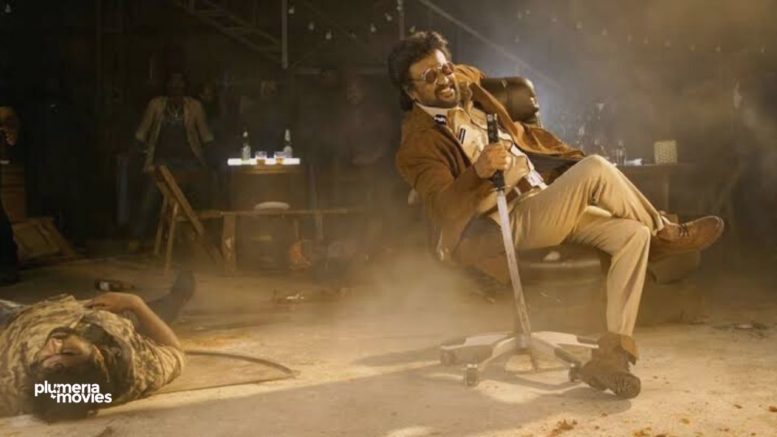It is all rains and gun-fires in Mumbai city, a night of hunt where none shall be spared for the mad cop is on his watch. On an electric note unfolds Darbar taking us to the ruthless killer cop, Aadithya Arunachalam with the flicker of lights, glorious shadows, shudders of the earth and an attitude of the king revealed in a magnificent air with chants of Thalaiva hailed aloud in the music, the theatre brimming with whistles and you know and have always did that it is a film for the star, of the star and crafted by his own iconic tropes.
Spectacle of the Star: Crafting a Film with Clichés
Darbar is a spectacle of the star which as a film works ‘with’ clichés and not ‘around’ clichés as Petta did. This renders the film both delightfully old-school and dully so. Rajini in all his glorious form and energy is Aadithya Arunachalam, the crusader of the rotting city of Mumbai. He is here to ‘detox’ it. With Alex Pandian’s righteousness he blends in his own charms delivering some very enjoyable stretches of investigations and police operations in the initial half of the film which inch almost closer to surprises but sure are enlivening.
Shift to Melodrama: A Drastic Turn in “Darbar”
He fathers a girl in her mid-twenties and takes jokes about his age in stride, exuding charm, acceptance, and a sense of ease. The action drama initially follows a relatively smooth trajectory, with Rajini enthusiastically engaging in playful mind games with rivals. However, this playfulness later gives way to brawls and fight sequences. The film also prematurely reveals what is meant to be a later revelation, disclosing the departure of a dear one before flashing back to the recent past. This dilutes the value of the subsequent shock and tension, leaving scant opportunities for discoveries in a tale that feels overly familiar to navigate. We also learn the identity of the murdered rival before Aadithya does, robbing the knowledge of any intrigue and leading instead to the dullness of what follows.
The ease, energy and electricity soon take a drastic turn when the film breaks off into melodrama. We know Aadithya Arunachalam as a cop, his enemy, Hari Chopra as a drug lord but we receive no vivid glimpses of what they actually are as people, as individuals. With Aadithya, the lovely little details help but the melodrama the flick reaches out to would have landed hard and aching if we knew better what Aadithya was like earlier, what his relationship with his wife was like and if his profession was the factor responsible for her fate. There are no internalisations of conflicts and what a human moment an instance of doubt, of fragility, of guilt could have been when he rages with the need to avenge the death of a departed dear.
Antagonist and Supporting Characters: Underwhelming Presence
The bleakness and lack of any significant threat in Sunil Shetty makes him an excruciatingly underwhelming presence opposite the massive star and the miniscule evidences of fatherly hurt, care and anger go amiss in a performance that doesn’t help render the antagonist a bit more concrete, in the least, as an embodiment of menace. It is true also of the other few significant characters present in the film with an exception of Valli, Aadithya’s daughter.
The rest merely function as props, revolving around the crusader with no striking will and identity of their own personalities and albeit this suiting a certain nature of this star outing, the lack of conflicts within and around these characters, specifically with the entire police force working in unison with Arunachalam’s vision sans a notable taint , a traitor, a rebellion and rather as a manifestation of virtuousness emerge vapid and almost too ideal, denied a potential to escalate the conflicts to exciting levels.
Aadithya as the Sun: Symbolism and Lack of Inventiveness
Aadithya possesses an instantly sturdy name, radiating with the brilliance of a star and synonymous with the sun. The hero labors diligently to conquer the supposedly dark clouds hanging over the city of Mumbai, rescuing it from the perils of its nights and demons. In the film’s predominant golden hues, Aadithya frequently bathes in the sun’s rays, basking in its shine and warmth. The sun, the star, unquestionably illuminates a day, providing it with a beginning, a trajectory, and a glorious conclusion.
In Darbar, Rajini is Aadithya, the sun and is the only glow and gem in a tale of clichés which soon loses its glory to its lack of inventiveness even within an old-school premise that still holds a substantial intrigue value. It is a sunny day, yet not a fine one.




Be the first to comment on "Darbar (Tamil) Review"